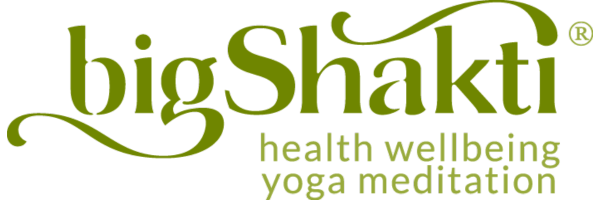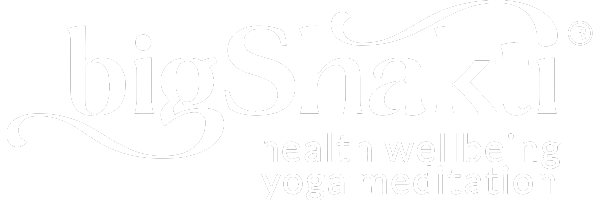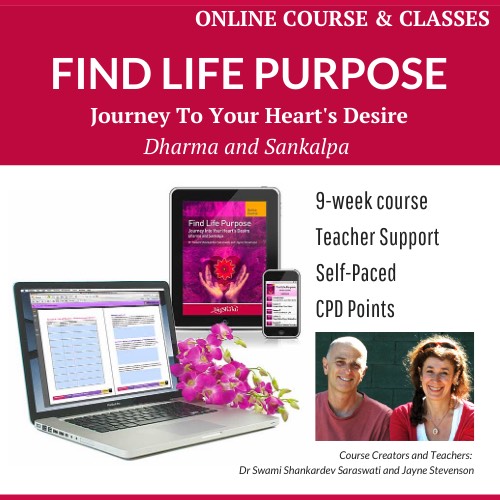Yoga of Mental Health Workshops → More Info
Pursue Your Purpose As Though Your Life Depends On It

“Purpose keeps you young, fit, and ALIVE,” — says medical science.
One of the great privileges of living in the current era is observing the remarkable correlation between ancient wisdom and modern medicine. For centuries, poets and philosophers have told us how important it is to have a purpose and to pursue your purpose as though your life depends on it. They advocated pursuing a purposeful life as the key to a more fulfilled existence.
In recent decades, medical research has reinforced this age-old guidance by proving that life's purpose is not merely a philosophical ideal but a vital part of maintaining well-being and longevity.
From a biological perspective, various research studies link a strong sense of purpose to improved physiological functioning, including healthy brain function, increased immunity, cardiovascular health, muscle strength, and sound sleep.
Psychologically, a strong sense of purpose is linked to a positive outlook, personal satisfaction, feelings of connectedness, and a developed sense of meaning.
Pursue Your Purpose: A Prescription for WellBeing
It is better to do one’s own dharma, even though imperfectly, than to do another’s dharma, even though perfectly. By doing one’s innate duties, a person does not incur sin. ― Lord Krishna, Bhagavad Gita: 8.47 (200 BCE)
In 1946, philosopher Viktor Frankl introduced a pivotal theory explaining how a sense of purpose contributes to longevity. According to Frankl, a higher purpose gives you a stronger will to live, empowering you to endure short-term discomfort by recognizing its more significant meaning.
Life is never made unbearable by circumstances, but only by lack of meaning and purpose, wrote Frankl in Man's Search For Meaning. Victor Frankl tells us that someone with a sense of purpose can better endure pain and suffering because the purpose transcends that suffering.
Modern medical research echoes Frankl's message by demonstrating that individuals with a clear sense of purpose willingly participate in time-consuming, complex, uncomfortable, or even painful activities.Purpose Motivates Healthier Lifestyle Choices
The mystery of human existence lies not in just staying alive, but in finding something to live for. ― Fyodor Dostoyevsky
A 6-year-long study showed that individuals with a sense of purpose are driven toward healthier lifestyles. They exercise more and have more frequent and regular health checkups.
Many of our students and clients who live purposeful lives are typical of this study. As they get clear on their purpose, it motivates them towards self-care. They tend to consume little or no alcohol. They maintain a healthy diet and engage in at least one form of regular exercise and reflection practice. Purposeful living is connected to Eros, the instinct to thrive. Eros fosters positive behaviors and reduces self-destructive tendencies.
This 2019 study shows purpose in life or a sense of mission as a modifiable "health asset" that enhances well-being. Many studies have focused on the aging population. Newer studies on adolescents show that purpose-orientated living reduces self-destructive behaviors, including drug addiction, acts of self-harm, and suicide. Both children and adults become motivated to develop healthy behaviors, untapped skills, and talents when they have a purpose.
Purposeful Work Enhances Cognition
Most people spend the greatest part of their time working to live, and what little freedom remains so fills them with fear that they seek out any and every means to be rid of it. ― Goethe
Without awareness of a higher goal or purpose, settling into dull routines and attempting to inoculate the accruing boredom with destructive habits is easy.
A Florida State University study of 4,963 adults aged 32–34 from 48 states concluded that boring, repetitive work causes cognitive decline.
The research challenges our centuries-long notion of work as a sacrificial means to a rewarding end. Pay-checks, bonuses, holidays, status, and prestige are not enough. You must have a purpose within your everyday work to prevent the brain function from declining.
Many new studies show that body mass, inflammation, and Alzheimer's disease decrease through a sense of purpose in daily activities.
Living Your Purpose Reduces Stress and Promotes Quality Sleep
There is a time for many words, and there is also a time for sleep. ― Homer, The Odyssey
Purposeful activity throughout the day reduces rumination and worry at bedtime. Various studies demonstrate that individuals who pursue their purpose experience fewer sleep disorders, emphasizing the link between purpose and restorative sleep.
This study showed that people with a purpose had reduced sleep disorders, including insomnia, sleep apnea, and Restless Leg Syndrome.
Sense of Purpose Improves Cardiovascular Health and Longevity
You possess a kind of inner force that seeks to guide you toward your Life’s Task–what you are meant to accomplish in the time that you have to live. — Robert Green
A meta-analysis by the American Psychosomatic Society concluded that “a higher sense of purpose in life is associated with a reduced risk for both cardiovascular disease events and all-cause mortality.”
The research spanned seven years and included 136,000 participants (average age of 67). The study evaluated the relationship between purpose in life and the risk of death or cardiovascular disease. The risk of death was about 20% lower for people who reported having a strong sense of purpose. They also had a lower risk of heart attack or stroke.
Purpose is not a luxury; it's necessary for health, positivity, and satisfaction at any age or circumstance.
Seven Tips For Becoming Purposeful
Human beings are not born once and for all on the day their mothers give birth to them, but … life obliges them over and over again to give birth to themselves. ― Gabriel García Márquez
- Grow Your Faith and Self-Belief: Reflect on the idea that life's purpose is not reserved for a select few—it's a fundamental aspect of your existence. If you don't believe it, read more science around that - challenge your belief.
- Contemplate Regularly: Contemplate your purpose on a regular base through meditative reflection on your thoughts and feelings around purpose. If you do not yet know your life purpose, discuss your lack of purpose with a trusted confidant or therapist.
- Transform Dull Work: If you surrender to dull work, your cognition will suffer. Either find new work with an element of challenge or use your current job as a (Zen) practice to hone your focus and create a purposeful work ethic.
- Build Your Purpose Muscles: See your body-mind as a conduit of purpose. Even if your purpose is vague, build your purpose muscles by engaging in intentional activities related to your health, connection to self and others, skills, and talents.
- Visualize Purpose Daily: Begin your day by visualizing your life purpose and your purpose for the day. At night, assess your actions. Did they follow your intent or go off course? Aim to close the gap, day by day.
- Get A New Purpose: If you lose one purpose, don’t feel compelled to remain in the same area as your previous purpose. Create a new purpose.
- Retire Purposefully: Ensure that you retire with a purpose because another compelling fact, proven by research, is that purposelessness in older adults leads to illness, depression, and early death.
Purpose Now, Not Later
Categories
- Yoga (13)
- Yoga Tantra (20)
- Meditation (23)
- Meditation Techniques (31)
- Ayurveda (3)
- Carl Jung (5)
- Chakras (14)
- Consciousness (17)
- Diseases (7)
- e-mag (9)
- Everyday Wisdom (6)
- Life Purpose (8)
- Mantras (18)
- Mental Wellness (44)
- Podcast (23)
- Prana - The subtle breath (14)
- Relaxation (18)
- Shadow Self (7)
- Spirituality (12)
- Symbols (2)
- Third Eye - Ajna Chakra (7)
- Wisdom (2)
- Yoga Nidra (12)
- Yoga Philosophy (16)
- Yoga Psychology (19)
- Yoga Therapy (41)
- Yoga Meditation Research (3)
- Articles by Jayne Stevenson (14)
- Articles by Swami Shankardev (25)
- Stress Management (11)
- Emotion (3)
- Self-Awareness (1)
- Self-Regulation (1)
- Healing (3)
2025 Yoga of Mental Health Workshops
- Sāṁkhya Philosophy & Mental Health: A Yogic Path to Holistic Well-being
- Uncovering the Roots of Mental Illness: Insights from the Gita & Patanjali
- Restoring Self-Regulation: Yogic Techniques for Emotional Resilience & Inner Strength
- Mantra Therapy: Transforming Thought Patterns for Emotional Healing & Mental Wellbeing







